SON HOUSE / “Who’s That Singing?”
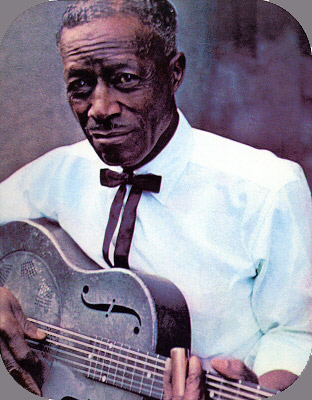
One Saturday evening Robert and a bunch others play for a picnic. One of the others was a visiting musician name of Son House, who some people say had just come out of Parchman behind shooting some man to death at a house party down near Lyon, Mississippi in 1928 but come out in less than two years when he got some judge down in Clarksdale to review his case, which go to prove it must’ve been self-defense and not no murder. Anyway, the function was being advertised as a special, end-of-the-season function. Peoples came from far as Memphis to hear what they call “The last cotton picking.” Harvest was all done. And folk took a week of rest, culminating in this big picnic.It was the best-est time Ginny ever had. Ever. They was gaming and funning and stuff. And all kinds of food, and special food too, not no every day food. Pies and cakes, and roasted pig with farmer Brown’s secret sauce, and everything. And the last of the watermelon. And even some sweet sugar cane brought up from way, way Louisiana south. Oh, it felt so good to be alive and laughing with folk, and children running around, and mens chunking horse shoes, and womens circling and quilting for Sarah, who was expecting—some kind of way the heifer had got herself in a family way long before Ginny did even though she weren’t hitched to nobody and Ginny was Mrs. Robert Johnson, but still it was nice, and still, since now Sarah weren’t no longer no kind of competition, Ginny even lent a hand stitching on the blue and yellow and white quilt what had stars and crescent moons patterned all over it. And, lord, when the music started up and all the dancing, oh lord. And Robert he was playing harp on account of farmer Brown and Mr. Son House was guitar playing. And when Mr. House started up, well, Ginny could see what Robert meant when he said how powerful Son House was. That man took to sweating music. She never seen nobody outside the church catch no spirit like Mr. House. Look like his eyes roll up all white and all, and his voice got raspy and wailing like he was a haint or something. And look like that sound was jumping out the side of his neck, through his bulging veins. Through his fingers. His trembling lips. The way he moan, he hoop. You could hear his voice all up the road and cross the hollow. But he weren’t just loud. He was powerful. And once he got going he was mighty, mighty strong winded. Plus, his guitar playing was so expert, sound sharp like hammer driving. Even fifty feet away you could hear every note on that steel body guitar he play with. He strummed that guitar like he was plowing with one of them new-fangled tractor machines, hit it with authority. And his songs was about everything. Ginny really liked when Mr. House did that song about scriptures. Who’s that’s writing? John the revelator! Who’s that writing? John the revelator! Talking about he wrote the book of the seven seals. And when he done “John The Revelator,” Mr. House, he just use his voice. No guitar. No shakers or knockers or nothing. No fiddles. No nothing but his voice and his two huge hands clapping together. And he growl from deep in his stomach. In fact, when he growled like that it sort of affected Ginny a little something like the way Robert’s music touch her. And that surprised Ginny, to feel herself responding to some other man like she was. But she comfort herself in noticing that she weren’t the onliest one touched by Mr. House, cause it look like everybody had stopped whatever else they was doing to draw close-close to Mr. House, and everybody was lining out “John The Revelator.” So Ginny guessed it wasn’t so bad to be moved when everybody else was being moved too, and wouldn’t nobody look askance at her for being moved by Mr. House. Ginny hoped that Robert wouldn’t be mad at her for liking Mr. House music so much, and singing, even though she really couldn’t sing, but singing out none the less just like as if she could sing good. She reckoned Robert would accept her singing to Mr. House’s music. She hoped so. Even at one point looked over at Robert with his harmonica in hand, standing behind Mr. House, responding right along with the crowd. Suddenly, like as if somebody come up behind her and covered her eyes and said “Guess who,” suddenly Ginny realized that she never sang along to Robert’s music cause when it was just him and her there wasn’t no reason for her to sing along and the few times she was with him playing for some peoples she had been so busy paying attention to what womens was paying attention to Robert she had never much paid attention to singing along with Robert. Ginny wondered did Robert want her to sing along. Ginny wondered about that as she sang along with Mr. House, and it made her feel good to sing to Mr. House’s music. But this all was peculiar. Robert, for his part, wasn’t studying nobody or nothing except Son House and how he was holding the crowd like a baby chick cupped in his two hands. That’s the kind of power Robert wanted to have—he wanted everybody who heard his music to respond to it, to be touched by it. Robert wanted his music to mean something to everybody. Everybody. Those were sweet days. Studying Son House. Loving Ginny . What could be better.
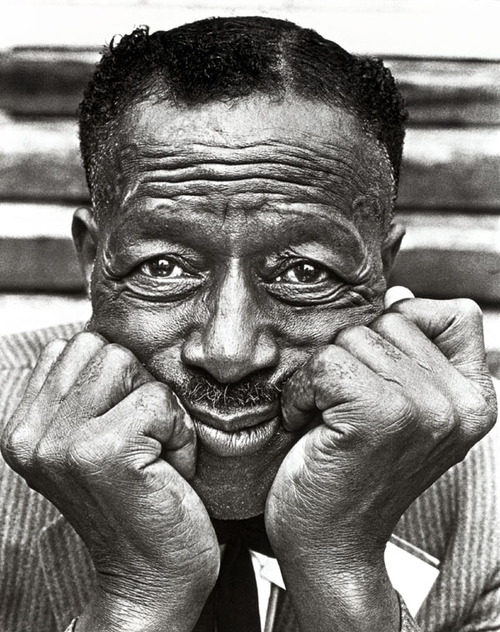 The above is an excerpt from Walkin’ Blues, my Robert Johnson novel. Robert studied under Son House and it’s not hard to hear the influence. Eddie James “Son” House, Jr. was born March 21, 1902 in Riverton, Mississippi and died October 19, 1988 in Detroit, Michigan.
Look like Mississippi produced nothing but cotton, blues singers, and mean-ass segregationists. Now while there was segregationists all over America, and certainly they grew cotton in other parts of the South, look like Mississippi had a lock on what came to be called Delta blues. Any half-way decent appreciation of Delta blues got to sit a spell at the feet of Son House.
Mr. House was one some kind of special somebody. He served time up at Parchman State Correctional facility for shooting a man in self defense. Son took a slug in the leg. The man died. Son was let out way early on account of the judge reviewed his case and considered self defense. Son also spent a time as a Baptist preacher. But the prison and pulpit was really preparation for Son’s real vocation: master of the Mississippi Delta blues.
The above is an excerpt from Walkin’ Blues, my Robert Johnson novel. Robert studied under Son House and it’s not hard to hear the influence. Eddie James “Son” House, Jr. was born March 21, 1902 in Riverton, Mississippi and died October 19, 1988 in Detroit, Michigan.
Look like Mississippi produced nothing but cotton, blues singers, and mean-ass segregationists. Now while there was segregationists all over America, and certainly they grew cotton in other parts of the South, look like Mississippi had a lock on what came to be called Delta blues. Any half-way decent appreciation of Delta blues got to sit a spell at the feet of Son House.
Mr. House was one some kind of special somebody. He served time up at Parchman State Correctional facility for shooting a man in self defense. Son took a slug in the leg. The man died. Son was let out way early on account of the judge reviewed his case and considered self defense. Son also spent a time as a Baptist preacher. But the prison and pulpit was really preparation for Son’s real vocation: master of the Mississippi Delta blues.
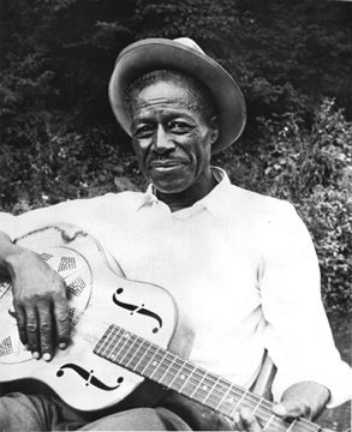 Son, he played on a steel body National guitar. Hit his lick like he was swinging a train track hammer or splitting logs with a double-headed axe. Plus, Mr. House used a steel bar on his ring finger to make the strings whine like electric lines in a summer thunderstorm. You can hear all that and a whole lot more in the way Son House sing, all big-bodied and full-throated and what not.
His vocal style was a combination of growling and howling, mixed with sarcasm and lost-soul wailing. To call him powerful is an understatement.
When I first started studying up on the Delta blues on a serious tip, I bought this Son House record along with a handful of others. Except for the Robert Johnson, this is the one I listened to the most. This is the one I learned from. This is the one you ought to know if you want to pass your blues literacy test.
There are about six or seven other albums and the early, early stuff is truly intoxicating but most of the audio fidelity is suspect. This one is clear. So even though this is Mr. House operating at three-quarters, he is a whole lot more strong-throated than most others giving 110-percent. In fact, truth be told, Mr. House gave up playing for about twenty years or so, left the South and moved up to Rochester, New York where he lived in obscurity until around 1964 when he was “re-discovered”—now ain’t that a double nothing. It’s bad enough when people “discover” you when you ain’t lost, imagine how it must feel to be “re-discovered” like as if you so dumb, you done lost yourself twice over.
What really had happened was that Negroes put their collective foots down, started to kicking up dust and what-not on Civil Rights marches. And as a result, people started to taking an interest in Black music believing the music to be something worth studying and listening. By the seventies, although he continued to play, Mr. House’s health gave out and he retired for a second time around 1974. So he had a second career that last approximately ten good years.
Son, he played on a steel body National guitar. Hit his lick like he was swinging a train track hammer or splitting logs with a double-headed axe. Plus, Mr. House used a steel bar on his ring finger to make the strings whine like electric lines in a summer thunderstorm. You can hear all that and a whole lot more in the way Son House sing, all big-bodied and full-throated and what not.
His vocal style was a combination of growling and howling, mixed with sarcasm and lost-soul wailing. To call him powerful is an understatement.
When I first started studying up on the Delta blues on a serious tip, I bought this Son House record along with a handful of others. Except for the Robert Johnson, this is the one I listened to the most. This is the one I learned from. This is the one you ought to know if you want to pass your blues literacy test.
There are about six or seven other albums and the early, early stuff is truly intoxicating but most of the audio fidelity is suspect. This one is clear. So even though this is Mr. House operating at three-quarters, he is a whole lot more strong-throated than most others giving 110-percent. In fact, truth be told, Mr. House gave up playing for about twenty years or so, left the South and moved up to Rochester, New York where he lived in obscurity until around 1964 when he was “re-discovered”—now ain’t that a double nothing. It’s bad enough when people “discover” you when you ain’t lost, imagine how it must feel to be “re-discovered” like as if you so dumb, you done lost yourself twice over.
What really had happened was that Negroes put their collective foots down, started to kicking up dust and what-not on Civil Rights marches. And as a result, people started to taking an interest in Black music believing the music to be something worth studying and listening. By the seventies, although he continued to play, Mr. House’s health gave out and he retired for a second time around 1974. So he had a second career that last approximately ten good years.
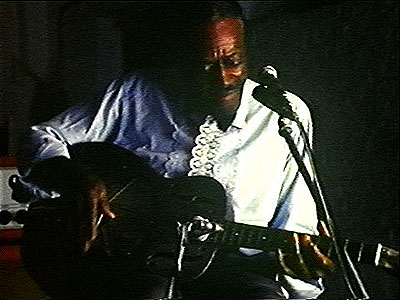 During the decade of activity, Son House became the leading, living practitioner of the Delta blues. Both of his chief rivals, Muddy Waters and Howlin’ Wolf had gone electric. Mr. House stood by the steel. During this period Alan Wilson became House’s manager. Wilson would go on to make a major name for himself with the group Canned Heat. Wilson is playing harmonica on “Levee Camp Moan.”
This is music that moves you. Indeed, it scares some people. Frightens away weak-spirited folk who find it too intense to enjoy. But for those who ain’t a-feared to get their insides stirred up, the music of Son House is a thrilling experience.
—Kalamu ya Salaam
During the decade of activity, Son House became the leading, living practitioner of the Delta blues. Both of his chief rivals, Muddy Waters and Howlin’ Wolf had gone electric. Mr. House stood by the steel. During this period Alan Wilson became House’s manager. Wilson would go on to make a major name for himself with the group Canned Heat. Wilson is playing harmonica on “Levee Camp Moan.”
This is music that moves you. Indeed, it scares some people. Frightens away weak-spirited folk who find it too intense to enjoy. But for those who ain’t a-feared to get their insides stirred up, the music of Son House is a thrilling experience.
—Kalamu ya Salaam
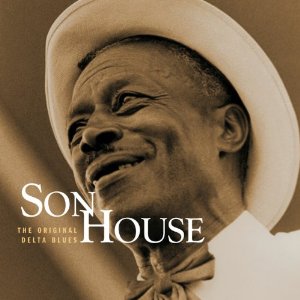 All tracks are from Original Delta Blues.
All tracks are from Original Delta Blues.
This entry was posted on Monday, June 21st, 2010 at 3:11 am and is filed under Classic. You can follow any responses to this entry through the RSS 2.0 feed. You can leave a response, or trackback from your own site.
One Response to “SON HOUSE / “Who’s That Singing?””
March 6th, 2012 at 11:53 pm
Thanks for this fascinating page! I’d be very interested to read your novel. I just finished the new biography of Son House, “Preachin’ the Blues” by Daniel Beaumont, and recommend it if you have not already read it.
I am the biographer of Alan Wilson from Canned Heat, and would like to make one respectful correction: Wilson did not become the manager of Son House. Dick Waterman was the person who took that role. House had been rediscovered by Waterman, Phil Spiro (Wilson’s roommate) and Nick Perls (founder of Yazoo Records).
Wilson did, however, participate in the rediscovery by helping House to re-learn his old songs. I’ve documented the full story of this in my Wilson bio, “Blind Owl Blues”. I hope you’ll check it out on my website, http://blindowlbio.com.
Thanks very much; it’s always nice to see the great Son House celebrated!
kalamu sez:
thanks much for the correction and the leads on material to read.
Leave a Reply
| top |